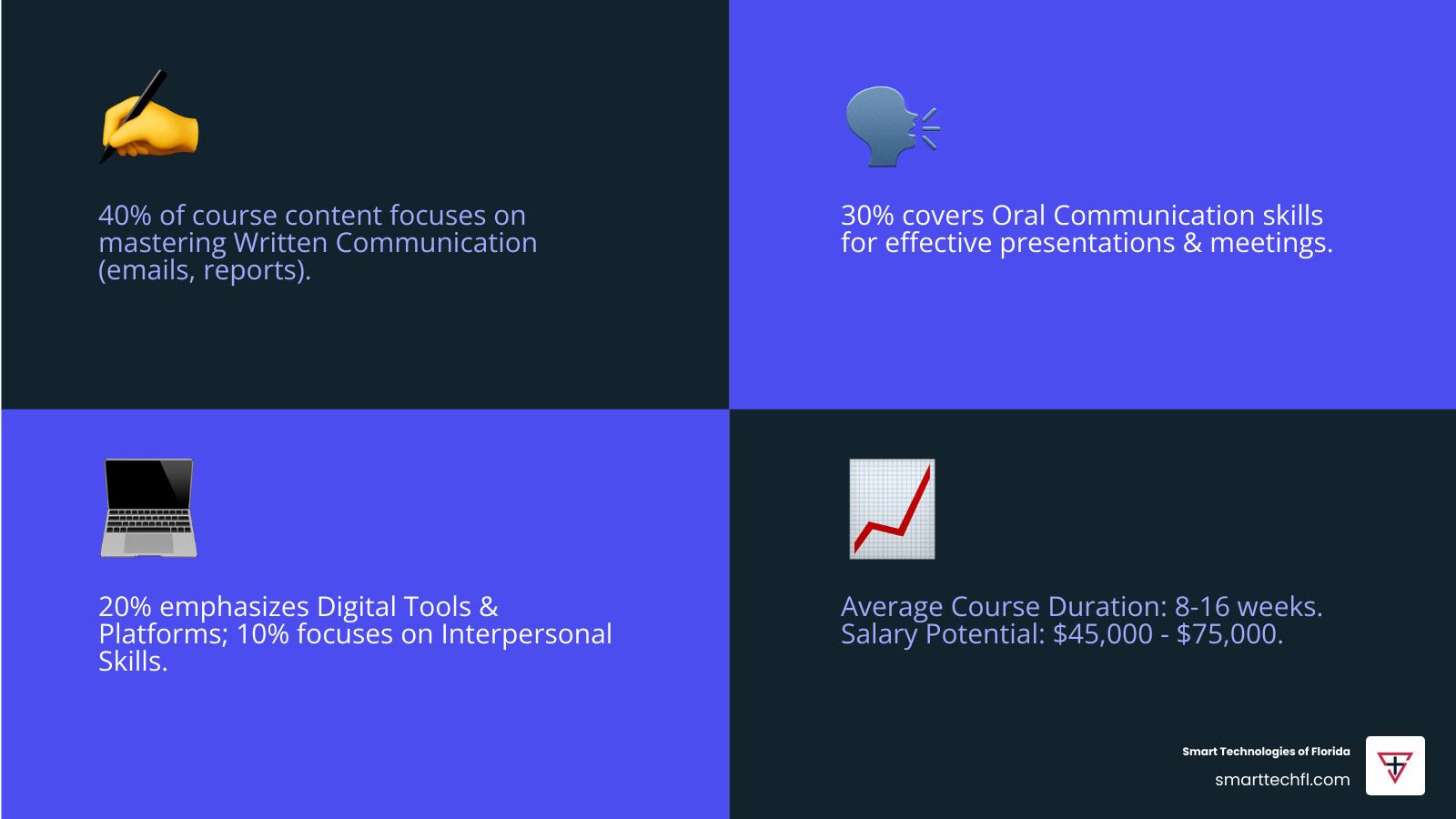Business and Tech Communication Courses That Actually Pay Off
A business and tech communication course teaches professionals to bridge the gap between technical concepts and business objectives through effective written, oral, and digital communication skills.
Top Business and Tech Communication Course Options:
- Certificate Programs: 8-16 weeks, $200-$500, focus on practical skills
- University Courses: 1-2 semesters, $1,000-$5,000, comprehensive curriculum
- Online Bootcamps: 4-12 weeks, $300-$2,000, flexible scheduling
- Corporate Training: 1-5 days, $500-$3,000, customized for teams
Key Skills You’ll Master:
- Technical writing and documentation
- Business presentation delivery
- Cross-cultural communication
- Digital collaboration tools
- Data visualization and storytelling
In today’s workplace, you can’t succeed with technical skills alone. You need to explain complex ideas to non-technical stakeholders, lead diverse teams through digital change, and present solutions that actually get approved.
The numbers back this up: communication skills consistently rank among the top skills employers seek. Business Communications Specialists in Canada earn an average of $60,000 per year, with experienced professionals commanding much higher salaries.
Whether you’re managing a retail business going digital or leading a tech team, these courses prepare you for real workplace challenges. You’ll learn to write emails that get responses, deliver presentations that drive decisions, and use modern communication tools effectively.
The best programs combine traditional business communication with today’s tech-focused workplace realities. You’ll practice with collaboration platforms, learn AI-assisted writing techniques, and master the art of explaining technical concepts to business audiences.

The Career-Boosting Power of Business and Tech Communication Skills
Here’s something that might surprise you: the professionals who advance fastest aren’t always the most technically skilled. They’re the ones who can explain complex ideas clearly, present solutions that actually get approved, and bridge the gap between technical teams and business stakeholders.
When you invest in a business and tech communication course, you’re not just learning to write better emails (though that’s part of it). You’re developing the strategic communication skills that transform good employees into leaders. We’ve seen countless professionals accelerate their careers simply by mastering the art of clear, persuasive communication.
The data backs this up perfectly. Communication skills consistently rank as the most in-demand skill among employers, and for good reason. Companies need people who can translate technical complexity into business value.
Key Skills Developed and Their Benefits
A quality business and tech communication course goes far beyond basic writing skills. Think of it as your toolkit for getting things done through words, whether spoken or written.
Audience analysis becomes your superpower. You’ll learn to read the room before you even enter it. When you’re presenting to C-suite executives, you’ll focus on ROI and strategic impact. When you’re explaining the same concept to developers, you’ll dive into technical specifications. This isn’t about changing your message – it’s about packaging it effectively.
Persuasive writing transforms your emails from ignored to acted upon. You’ll master the art of crafting proposals that get approved, reports that drive decisions, and memos that actually get read. The best courses teach you to write with purpose, ensuring every sentence moves your reader toward action.
Public speaking and presentation skills help you command the room, whether it’s a team meeting or a board presentation. Many programs include practical formats like “2-minute elevator pitches” and “10-minute project updates” – real scenarios you’ll face at work. UC Berkeley Extension’s “Business Communication: Writing and Speaking” program exemplifies this hands-on approach.
Data visualization skills help you turn spreadsheets into stories. In our data-driven world, the ability to present complex information visually isn’t just helpful – it’s essential. You’ll learn to create charts and graphs that actually clarify rather than confuse.
Interpersonal skills round out your communication toolkit. You’ll find how to facilitate productive meetings, manage different communication styles, and steer both formal and informal workplace interactions. These skills help you build the relationships that fuel career advancement.
The beauty of these skills lies in their immediate applicability. You’ll craft emails that cut through inbox clutter, deliver presentations that inspire action, and write technical reports that non-technical people actually understand. Most importantly, you’ll learn to tailor every message for maximum impact.
Career Pathways and Salary Expectations
The versatility of communication skills opens doors across virtually every industry. Whether you’re in technology, healthcare, finance, or retail, these skills make you more valuable and more promotable.
As a Business Communications Specialist, you’ll manage internal and external messaging for organizations, ensuring consistent, effective communication across all channels. In Canada, these professionals earn an average of $60,000 per year, with experienced specialists commanding significantly higher salaries.
Project Manager roles naturally attract strong communicators. After all, successful projects depend on clear stakeholder communication, effective team coordination, and the ability to present progress and challenges clearly to leadership.
B2B Sales professionals who can articulate complex solutions clearly consistently outperform their peers. Your ability to translate technical features into business benefits becomes your competitive advantage.
Technical Writer positions perfectly blend technical knowledge with communication expertise. You’ll create user manuals, online help content, and documentation that bridges the gap between complex systems and everyday users.
Public Relations Specialists craft and distribute messages that shape public perception. Your communication training becomes the foundation for managing organizational reputation and stakeholder relationships.
The Content Creator and Digital Strategist roles leverage your understanding of audience analysis and platform-specific communication. You’ll develop engaging content across various digital channels, requiring both creativity and strategic thinking.
Even roles in Logistics Coordination, Office Administration, and Management benefit enormously from strong communication skills. Clear, precise communication ensures smooth operations and effective team leadership.
A Certificate in Business Communications can fast-track your entry into these fields, often requiring just 8-16 weeks of focused study. More comprehensive programs like Communication and Digital Media Studies prepare you for specialized roles including journalism, content creation, and digital storytelling.
The best part? These skills compound over time. As you advance in your career, your ability to communicate effectively becomes even more valuable, opening pathways to senior leadership roles across industries.
What to Expect: Core Curriculum and Learning Objectives

When you sign up for a business and tech communication course, you’re not just learning theory – you’re getting hands-on practice with the exact challenges you’ll face at work. These programs are built around real-world scenarios, like explaining a complex software rollout to your team or writing a proposal that actually gets approved by executives.
The best part? You’ll walk away with skills you can use immediately. Whether you’re crafting your first technical report or preparing for a big presentation, these courses give you the confidence and tools to succeed.
Mastering Written, Oral, and Digital Communication
Think of communication skills like a three-legged stool – you need all three legs to stay balanced in today’s workplace. A solid business and tech communication course covers written communication, oral communication, and digital communication in equal measure.
Written communication forms the backbone of professional success. You’ll learn to write business memos and letters that get straight to the point, craft technical reports and proposals that tell compelling stories with data, and master email etiquette that saves everyone time. The technical writing component is especially valuable – you’ll practice turning complex information into clear, accessible documents that anyone can understand.
When it comes to oral communication, these courses go far beyond basic public speaking. You’ll develop presentation delivery skills that keep audiences engaged, learn meeting facilitation techniques that actually lead to decisions, and practice interviews and negotiations in a safe environment. The key is learning to adapt your communication style to different audiences – what works with your tech team might not work with the board of directors.
Digital communication is where these courses really shine in today’s workplace. You’ll explore social media strategy for professional branding, develop content creation skills for blogs and digital storytelling, and build digital literacy foundations that many traditional programs skip. Programs like the EBT4O Open Business and Technological Communication course specifically focus on information and communication technology in business environments, preparing you for the digital-first workplace.
Harvard Business School’s Management Communications Online Course exemplifies this comprehensive approach. Students get guided practice in planning, writing, and presenting, with a focus on influencing action through well-organized communication strategies. It’s not just about talking – it’s about getting results.
How Courses Incorporate Modern Communication Technology
Here’s where business and tech communication courses really prove their worth – they teach you using the same tools you’ll use at work. No outdated textbooks or theoretical exercises. You’re learning on platforms your future employer probably already uses.
Collaboration platforms like Microsoft Teams and Slack aren’t just mentioned in passing – you’ll actually manage projects, share documents, and communicate with classmates using these tools. It’s like getting a sneak peek into how distributed teams really work.
VoIP solutions and cloud-based communication systems are woven throughout the curriculum because they’re essential to modern business. You’ll understand how Voice over Internet Protocol systems facilitate clear, efficient communication and learn about features that boost productivity. These aren’t just technical concepts – they’re practical tools that can transform how businesses operate.
The most forward-thinking courses are even incorporating AI writing assistants into their curriculum. Programs like “English For IT: Communication” teach students to work with tools like ChatGPT for tasks such as resume creation and effective prompting. This isn’t about replacing human communication – it’s about augmenting your abilities with smart technology.
Presentation software training goes beyond basic PowerPoint slides. You’ll learn advanced features, multimedia integration, and data visualization best practices that make your presentations memorable and persuasive. Some courses also touch on data analytics tools, helping you interpret and communicate insights effectively.
By focusing on these real-world technologies, these courses ensure you’re not just a good communicator – you’re a technologically fluent professional ready to leverage digital solutions in any business environment. You’ll bridge the gap between traditional communication principles and the practical demands of today’s digitally transformed workplace.
How to Choose the Right Business and Tech Communication Course

Choosing the right business and tech communication course can feel overwhelming when you’re staring at dozens of options online. But here’s the good news: with so many quality programs available, you’re almost guaranteed to find one that fits your situation perfectly.
The key is being honest about your goals, budget, and how you actually learn best. Are you looking to land a promotion in six months? You’ll want a focused certificate program. Planning a complete career change? A comprehensive degree program might be worth the investment.
Your learning style matters too. Some people thrive in live, interactive environments where they can ask questions on the spot. Others prefer the flexibility to pause a video lecture while juggling work and family responsibilities. Neither approach is better – it’s all about what works for you.
Delivery Methods and Program Formats
The beauty of today’s education landscape is the variety of ways you can gain these essential skills. Online courses have become incredibly sophisticated, offering the flexibility that working professionals desperately need. You can learn at your own pace, often with access to recorded lectures you can review multiple times. Programs like the Management Communications Online Course from Harvard Business School deliver high-quality content through video lessons and interactive exercises, proving that distance learning can be just as effective as traditional classroom settings.
Certificate programs are the sweet spot for many professionals. These focused programs typically run 8-16 weeks and cut straight to the skills employers want. You’re not spending time on theoretical concepts you’ll never use – instead, you’re practicing real scenarios like writing compelling proposals or delivering presentations that actually persuade people. Some programs offer morning schedules that wrap up in 8 weeks, while evening options stretch to 12 weeks to accommodate your day job.
For those seeking comprehensive knowledge, degree programs like a Bachelor of Arts in Communication and Digital Media Studies provide deep theoretical understanding alongside practical skills. These programs explore the broader impact of communication in our digital world, preparing you for senior leadership roles where strategic thinking is crucial.
Don’t overlook workshops and seminars for targeted skill building. These intensive, short-term sessions are perfect when you need to master a specific area quickly – maybe you’re presenting to the board next month and need to polish your public speaking skills fast.
Prerequisites for a Business and Tech Communication Course
Most business and tech communication courses are designed to be accessible, but understanding the requirements upfront saves you time and disappointment. For certificate programs, the barriers are typically low – you’ll need English proficiency since communication is the whole point, but many programs welcome students from diverse educational backgrounds.
Degree programs are more structured in their requirements. You’ll generally need a high school diploma with strong grades in English courses. In Ontario, for example, programs often require ENG4U or equivalent. International students should be prepared to demonstrate English proficiency through tests like IELTS, TOEFL, or Duolingo English Test.
Here’s something many people don’t realize: if you’re over 21 and don’t meet traditional academic requirements, mature student status can open doors. Institutions recognize that life experience and professional background can be just as valuable as formal grades. This pathway is perfect for career changers who’ve been working in technical roles and now want to develop their communication skills.
Specialized courses may have unique requirements. A program like “English for IT: Communication” assumes Intermediate to Upper-Intermediate English proficiency, acknowledging that participants already have technical knowledge but need to communicate it more effectively.
The application process is usually straightforward, but start early. University admissions websites provide detailed requirements for different applicant types, from recent high school graduates to international students to those who were homeschooled. When it comes to course materials, institutions often direct you to campus stores for textbooks and resources – just another detail to factor into your planning and budget.
These prerequisites aren’t meant to exclude people – they’re designed to ensure you’ll succeed in the program. If you’re unsure about your qualifications, reach out to admissions counselors. They’re typically happy to discuss your specific situation and suggest the best path forward.
Frequently Asked Questions about Business and Tech Communication Courses
When people are considering enrolling in a business and tech communication course, we hear the same thoughtful questions come up again and again. These are smart questions that show you’re thinking strategically about your investment in professional development.
What is the difference between business communication and technical communication?
While a business and tech communication course masterfully weaves these two areas together, understanding their distinct purposes helps you appreciate what you’re getting.
Business communication is the broader umbrella that covers how organizations share information to achieve their goals. Think of it as the art of making things happen through words. You’re crafting marketing messages that resonate with customers, writing internal memos that align teams, delivering sales pitches that close deals, and managing relationships with stakeholders. It’s all about the “what” and “why” of business – conveying vision, building trust, and driving action.
Technical communication, on the other hand, is the science of making complex information crystal clear. This is where you’re translating technical expertise into something everyone can understand and use. You’re writing user manuals that actually help people, creating software documentation that prevents support headaches, and explaining intricate processes in ways that make sense. The focus here is on the “how” and “how to” – precision, clarity, and usability reign supreme.
Here’s what makes modern courses so valuable: they blend both worlds seamlessly. You’ll learn to not only explain how a complex software system works (technical communication) but also persuade executives to invest in it, market it effectively to customers, and lead the team building it (business communication). It’s like being bilingual in the language of business and technology.
How long does it take to complete a business communication course?
The beauty of business and tech communication courses is that there’s truly something for every schedule and commitment level. Your timeline depends entirely on how deep you want to dive and how much time you can dedicate.
If you need a quick skill boost, workshops and seminars might be perfect – we’re talking just a few hours to a couple of days focusing on specific skills like presentation delivery or email mastery. For busy professionals, online modules offer incredible flexibility, with some comprehensive programs like the Management Communications Online Course requiring just 18-22 hours of seat time that you can spread across weeks.
Certificate programs hit the sweet spot for many people, typically running 8-16 weeks. The “English For IT: Communication” course, for example, packs a powerful punch in just 7 weeks. These programs are designed to give you job-ready skills without the long-term commitment of a degree.
If you’re taking a course as part of a university program, expect about one academic semester (3-4 months) for a single course. Full degree programs naturally take longer – usually three to four years – but they provide the most comprehensive foundation.
The key is matching your timeline to your goals. Need to improve your presentation skills for next month’s board meeting? A workshop might do the trick. Looking to pivot your career? A certificate program could be your launching pad.
Are online business communication courses as effective as in-person ones?
This is probably the question we get most often, and the answer is a resounding yes – when done right. Online business and tech communication courses have evolved far beyond watching static videos alone in your living room.
The most effective online programs create genuine interaction and engagement. You’ll find live virtual classrooms where you can ask questions in real-time, participate in group discussions, and get immediate feedback on your presentations. Many courses incorporate peer review systems where you’re collaborating with classmates from around the world, giving you exposure to diverse communication styles and perspectives.
What really makes online courses shine is the personalized feedback. Programs like “English For IT: Communication” combine human mentors who provide speaking and pronunciation feedback with AI-assisted tools that give you instant insights on your writing. This blend of human expertise and technology creates a learning experience that’s both personal and efficient.
The flexibility factor can’t be overstated. You can immediately apply what you’re learning in your current job, reinforcing concepts in real-world situations. That project presentation you’re working on? Perfect opportunity to practice those new storytelling techniques you just learned.
When choosing an online course, look for programs that emphasize interaction, provide multiple types of feedback, and create community among students. The most successful online learners are those who actively engage with the material and their fellow students, treating it as seriously as they would an in-person class.
The bottom line? Online courses can be incredibly effective, especially for working professionals who need flexibility without sacrificing quality. Just make sure you’re choosing a program that prioritizes engagement over convenience.
Conclusion

The workplace has changed dramatically, and the professionals who thrive are those who can speak both languages – business and technology. When you invest in a business and tech communication course, you’re not just learning to write better emails or give smoother presentations. You’re developing the superpower of translation: turning complex technical concepts into compelling business cases that get approved and funded.
Think about it – every great innovation needs someone who can explain why it matters. Every successful project needs a leader who can rally both the coding team and the C-suite. That’s exactly what these skills do for your career.
The numbers don’t lie either. We’ve seen how Business Communications Specialists can earn $60,000 or more annually, but the real value goes beyond salary. These strategic change capabilities make you the person others turn to when things need to happen. You become the bridge between digital solutions and real business results.
What makes this even more powerful is the people-centric approach these courses teach. Technology is amazing, but it only works when people understand it, buy into it, and use it effectively. That’s where your communication skills become absolutely critical.
At Smart Technologies of Florida, we’ve spent 23 years helping organizations transform through technology. But here’s what we’ve learned: the most sophisticated digital solution in the world won’t succeed without clear communication. The best skill development happens when people can connect new tools to their daily work in meaningful ways.
Whether you’re just starting your career or looking to level up, these courses give you something invaluable – the ability to make complex things simple and compelling. When change is the only constant, that’s not just a nice-to-have skill. It’s essential.
Ready to see how better communication can transform your organization’s technology adoption? Explore our business communication solutions and find how we help teams bridge the gap between great technology and great results.












